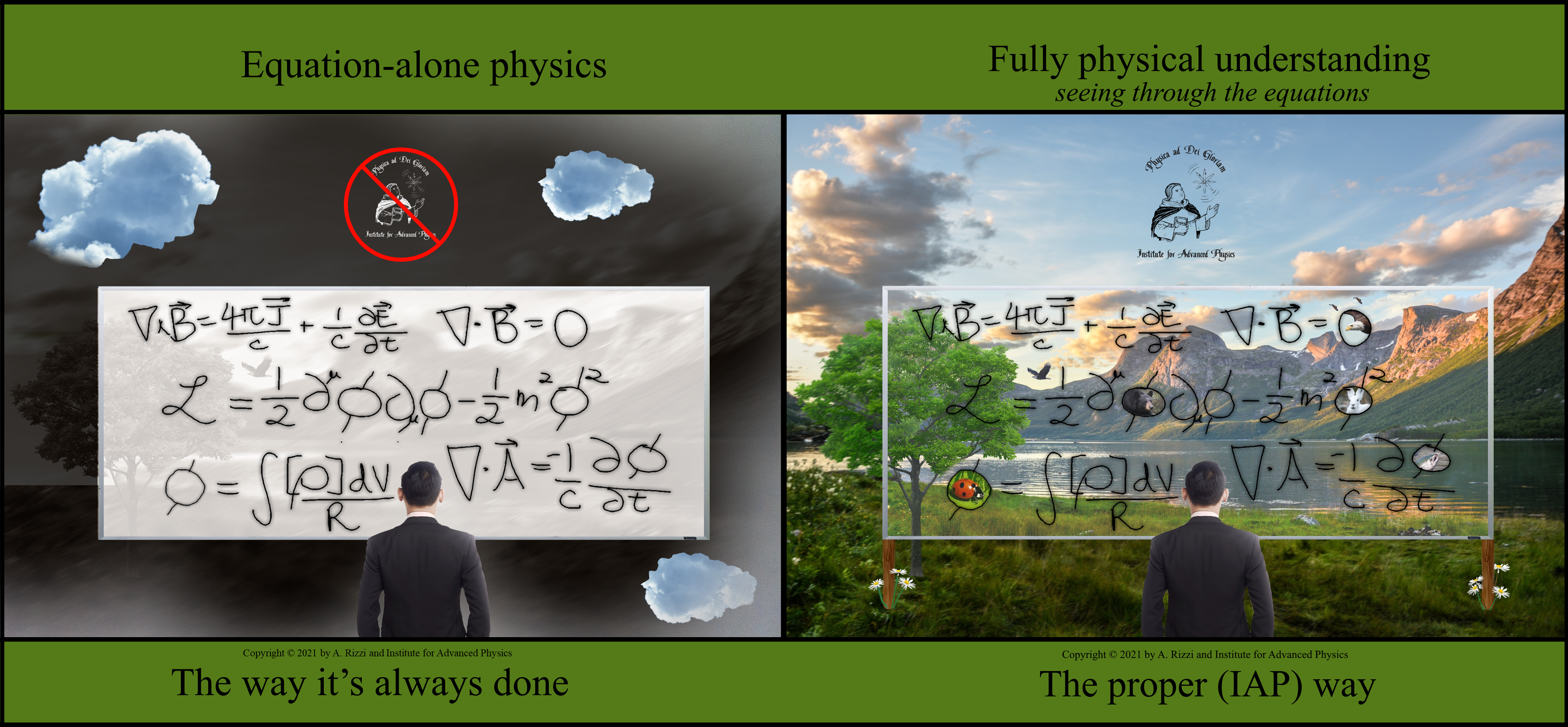Mission Statement FAQ
The Institute for Advanced Physics is established to advance modern science in a balanced fashion that does not leave behind the correct philosophical foundations, nor the proper moral and spiritual components.
Yes. Without a sound physics, one will not have a sound culture. Here is the basics of the proof that our culture is in trouble and that it will remain in trouble if we do not pay attention to physics:
Note, none of this should be taken to imply that modern science is, in itself, a negative development. In fact, modern science is clearly essential and irreplaceable. Modern science and modern mathematics have in their own way made so many deep and wide advances, one risks understatement even trying to state it. The problem is that the equational form that is the most formed output of modern science needs to be grounded in the first simple things we know through the senses. Even to fill out what this means, let alone the deep research and education it calls for, is much more than can be said on a web page. For this, see, for example, Dr. Rizzi's Science before Science: A Guide to Thinking in the 21st century.

Anywhere physical science is done, one finds a ready defense of certain basic truths. Scientists hold that the world is rational and understandable by us. Science is one of the few arenas in modern culture where objectivity is respected. As Nietzsche, albeit from a hostile prospective, pointed out, those who study the world and hold to the reality of objective understanding witness to the God of Truth. Still, scientists have inadvertently allowed the poison of subjectivism to enter through various port holes. Leading scientists hold, for example, using facts of quantum mechanics, that the world is not there when you’re not looking at it!1 Of course, this entails a kind of split thinking, for while they're actually doing their science they obviously think that they are learning something about a real world whose existence is not merely an aspect of themselves. The root causes of such a schizophrenic state must be addressed or science itself will be undermined by its unintended subjectivist fruit.
Now, science is extremely important. It is a key driving force in intellectual and cultural formation. Yet, moral, spiritual and philosophical poverty truly exist in modern day science departments. Morally, men of science are ready to treat human beings as mere objects for and of research. Increasingly science is animated by a disordered curiosity, not unlike that of Mary Shelley’s Dr. Frankenstein. Spiritually, the life of the soul and its directedness toward God are ignored and even despised. Philosophically, physica (physics)2, the study of changeable being, is now for all practical purposes narrowed to the empiriometric and the empirioschematic tools of physica.3 This has bred a narrowness of thought and personality that is creating an increasingly toxic atmosphere for human minds and hearts. There is a clear need for reestablishing right order in all these areas.
The Institute will begin to reestablish balance by deeply studying and advancing our knowledge in these areas, by making bare the foundations of science and applying them rigorously to old and new scientific knowledge, thereby opening new areas of research. Initially, this information and training will be disseminated through seminars, conferences, internships, books (including texts), journal articles, course materials at a distance university run through Notre Dame (see ICU web site), television programs, newsletters and Internet activities. Though the Institute primarily targets higher education, it will also, of necessity, foster high school science education through these means as well. The end goal of the Institute is to partner with a Catholic university to provide undergraduate and graduate education in science in an educational atmosphere that is fully human, incorporating the appropriate philosophical, moral and spiritual components.
It is important to remember, what we used to know implicitly as a culture, that both science and philosophy study the same subject, reality and thus are fundamentally the same. I summarize this as:
Using the word "science" emphasizes the content of what we know, while using the word "philosophy" emphasizes its meaning. Clearly, they are referring to the same thing as one cannot have content without meaning or meaning without content. They both refer to the study of reality. But, how can we even talk about content without meaning? The equations of modern physics, the generic base science upon which all others build, provide, at one level, deep access to the physical world but the meaning is deeply embedded in the equational structure, not immediately accessible.
In our search for understanding (meaning), we see the proper orientation of our gaining knowledge, which is to grow in understanding, grow in wisdom. We should love to grow in knowledge. Again, knowledge of reality that one does not understand is not really knowledge at all, while neither is understanding that has no content. The words "science" and "philosophy" emphasize different aspects of the same thing.
In short, philosophy should not be a separate subject as we usually treat it and think of it today. One should be wise in whatever subject one studies and does. Wisdom should not be left to someone else outside one's profession or any part of one's life. One should be wise in engineering and in physics and in anything and everything one studies and does.
Footnotes:Note all the above material is copyrighted and should not be reproduced in any way (copyright Anthony Rizzi © 2003). Any use of the concepts on this page should credit "Dr. Rizzi's answers in the mission FAQ of the Institute for Advanced Physics at iapweb.org." Any use of the concepts anywhere on this site should credit the Institute for Advanced Physics.
IAP is tax-exempt, publicly supported and recognized by the
Internal Revenue Service as a 501c(3) organization.
